Organisational Behaviour Report: Culture, Power, and Teams
VerifiedAdded on 2020/07/22
|16
|5707
|212
Report
AI Summary
This report examines organisational behaviour through a case study of Cadbury and the BBC, focusing on how organisational culture, power dynamics, and politics influence team behaviour and performance. It explores Charles Handy's cultural typology, analyzing the impact of power, culture, and politics on employee actions and organisational outcomes within the BBC. The report also delves into motivational theories, including Maslow's hierarchy of needs and Herzberg's two-factor theory, to enhance team effectiveness. Furthermore, it discusses various types of teams, team development strategies, and organisational factors impacting productivity, such as barriers to performance. The analysis provides insights into the application of these concepts in a business context, offering recommendations for improving employee motivation and overall organisational success.
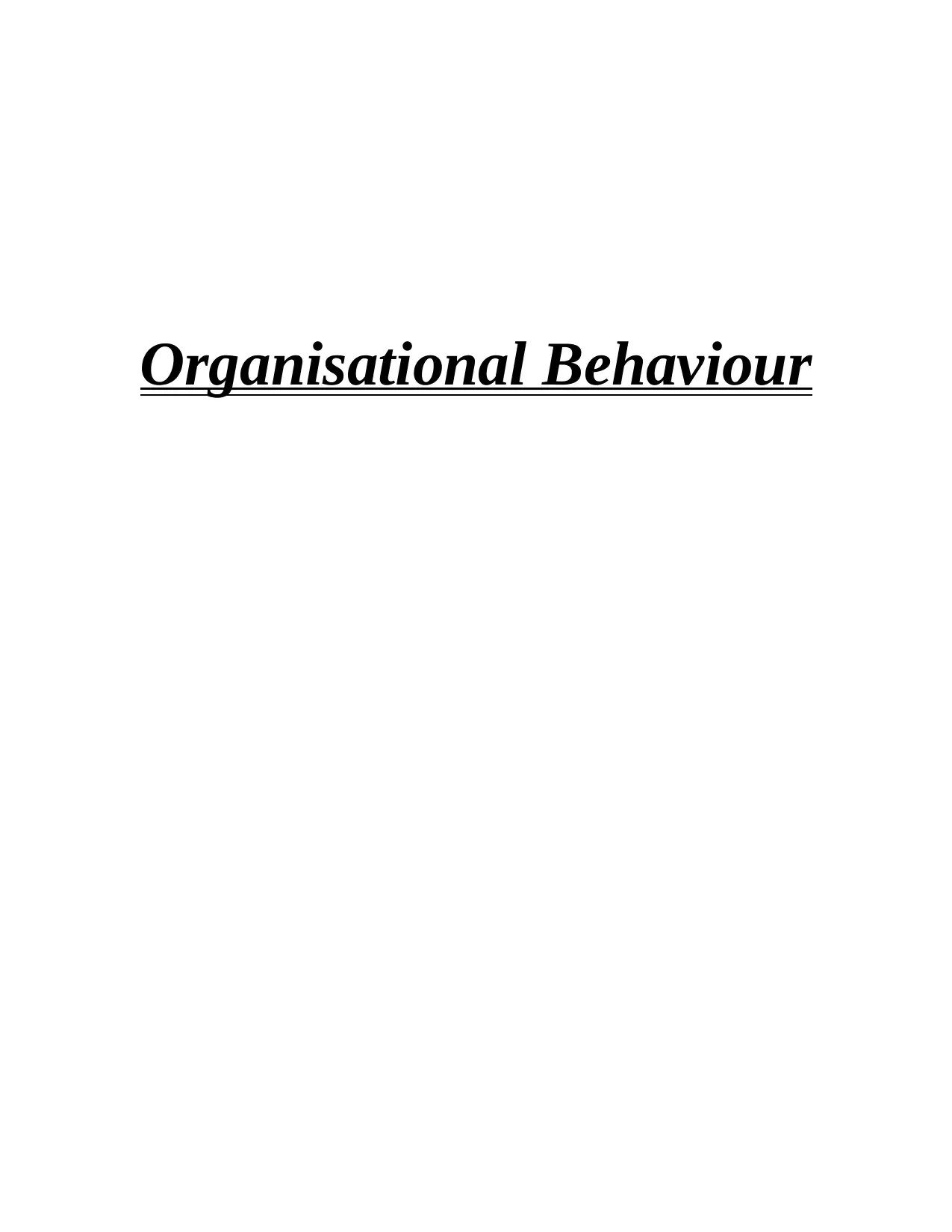
Organisational Behaviour
Paraphrase This Document
Need a fresh take? Get an instant paraphrase of this document with our AI Paraphraser
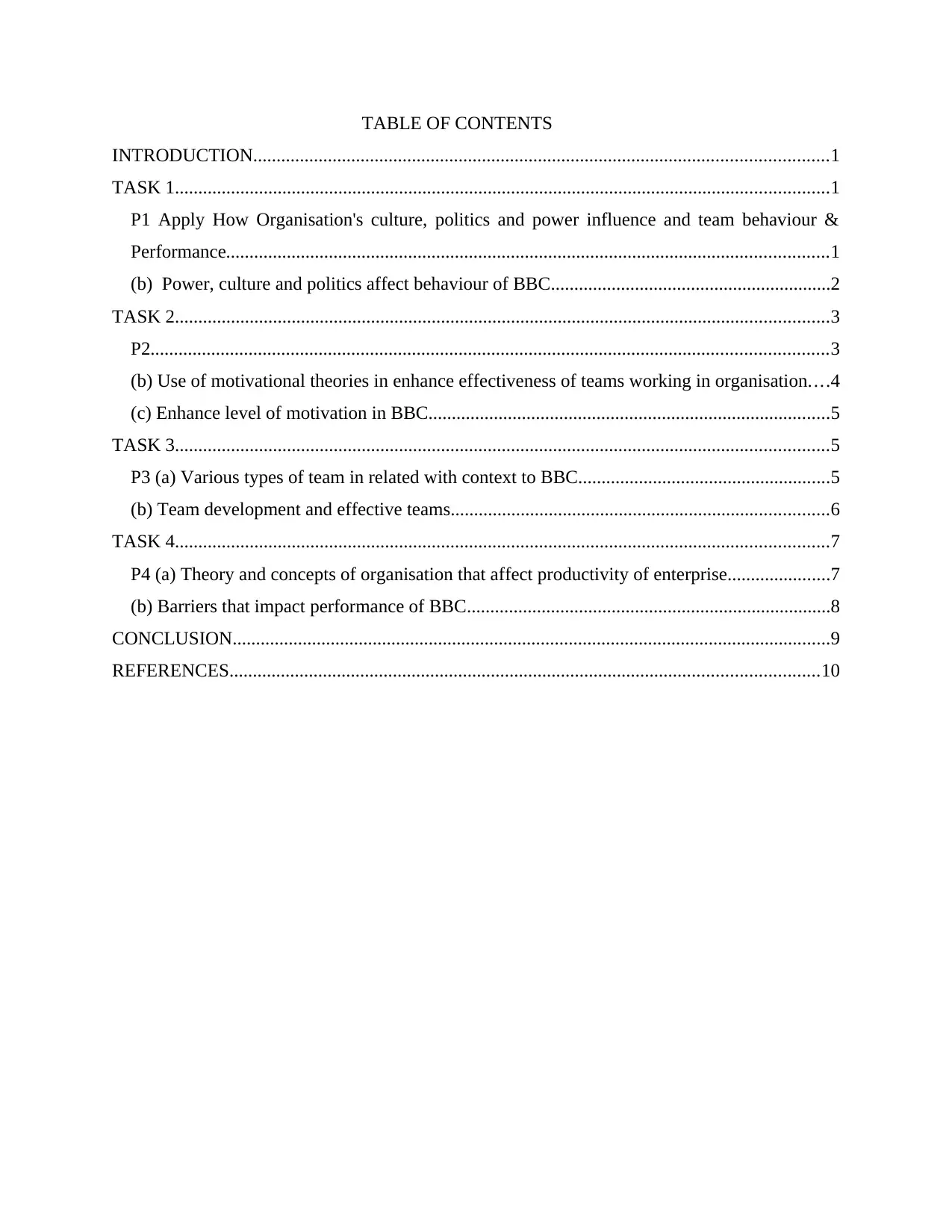
TABLE OF CONTENTS
INTRODUCTION...........................................................................................................................1
TASK 1............................................................................................................................................1
P1 Apply How Organisation's culture, politics and power influence and team behaviour &
Performance.................................................................................................................................1
(b) Power, culture and politics affect behaviour of BBC............................................................2
TASK 2............................................................................................................................................3
P2.................................................................................................................................................3
(b) Use of motivational theories in enhance effectiveness of teams working in organisation....4
(c) Enhance level of motivation in BBC......................................................................................5
TASK 3............................................................................................................................................5
P3 (a) Various types of team in related with context to BBC......................................................5
(b) Team development and effective teams.................................................................................6
TASK 4............................................................................................................................................7
P4 (a) Theory and concepts of organisation that affect productivity of enterprise......................7
(b) Barriers that impact performance of BBC..............................................................................8
CONCLUSION................................................................................................................................9
REFERENCES..............................................................................................................................10
INTRODUCTION...........................................................................................................................1
TASK 1............................................................................................................................................1
P1 Apply How Organisation's culture, politics and power influence and team behaviour &
Performance.................................................................................................................................1
(b) Power, culture and politics affect behaviour of BBC............................................................2
TASK 2............................................................................................................................................3
P2.................................................................................................................................................3
(b) Use of motivational theories in enhance effectiveness of teams working in organisation....4
(c) Enhance level of motivation in BBC......................................................................................5
TASK 3............................................................................................................................................5
P3 (a) Various types of team in related with context to BBC......................................................5
(b) Team development and effective teams.................................................................................6
TASK 4............................................................................................................................................7
P4 (a) Theory and concepts of organisation that affect productivity of enterprise......................7
(b) Barriers that impact performance of BBC..............................................................................8
CONCLUSION................................................................................................................................9
REFERENCES..............................................................................................................................10
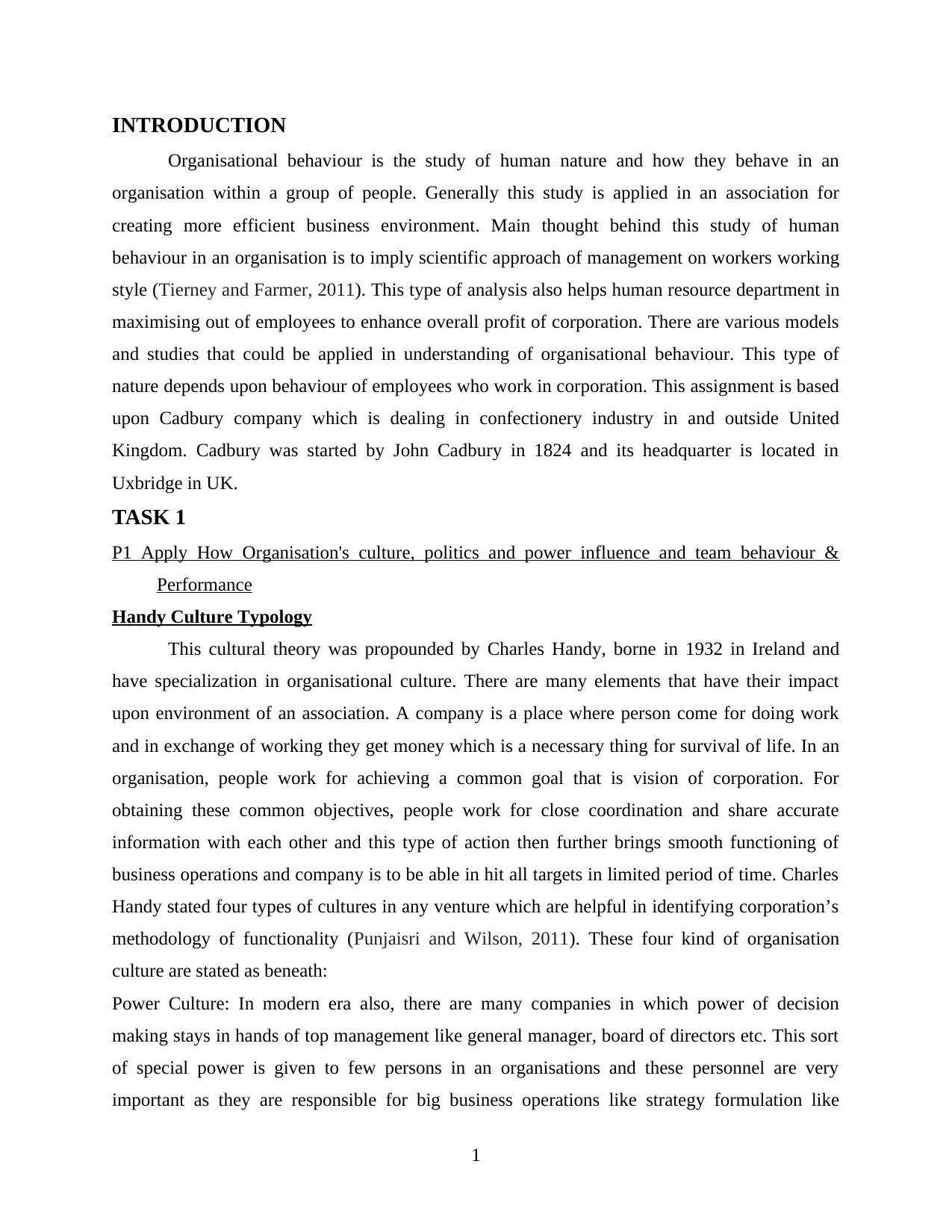
INTRODUCTION
Organisational behaviour is the study of human nature and how they behave in an
organisation within a group of people. Generally this study is applied in an association for
creating more efficient business environment. Main thought behind this study of human
behaviour in an organisation is to imply scientific approach of management on workers working
style (Tierney and Farmer, 2011). This type of analysis also helps human resource department in
maximising out of employees to enhance overall profit of corporation. There are various models
and studies that could be applied in understanding of organisational behaviour. This type of
nature depends upon behaviour of employees who work in corporation. This assignment is based
upon Cadbury company which is dealing in confectionery industry in and outside United
Kingdom. Cadbury was started by John Cadbury in 1824 and its headquarter is located in
Uxbridge in UK.
TASK 1
P1 Apply How Organisation's culture, politics and power influence and team behaviour &
Performance
Handy Culture Typology
This cultural theory was propounded by Charles Handy, borne in 1932 in Ireland and
have specialization in organisational culture. There are many elements that have their impact
upon environment of an association. A company is a place where person come for doing work
and in exchange of working they get money which is a necessary thing for survival of life. In an
organisation, people work for achieving a common goal that is vision of corporation. For
obtaining these common objectives, people work for close coordination and share accurate
information with each other and this type of action then further brings smooth functioning of
business operations and company is to be able in hit all targets in limited period of time. Charles
Handy stated four types of cultures in any venture which are helpful in identifying corporation’s
methodology of functionality (Punjaisri and Wilson, 2011). These four kind of organisation
culture are stated as beneath:
Power Culture: In modern era also, there are many companies in which power of decision
making stays in hands of top management like general manager, board of directors etc. This sort
of special power is given to few persons in an organisations and these personnel are very
important as they are responsible for big business operations like strategy formulation like
1
Organisational behaviour is the study of human nature and how they behave in an
organisation within a group of people. Generally this study is applied in an association for
creating more efficient business environment. Main thought behind this study of human
behaviour in an organisation is to imply scientific approach of management on workers working
style (Tierney and Farmer, 2011). This type of analysis also helps human resource department in
maximising out of employees to enhance overall profit of corporation. There are various models
and studies that could be applied in understanding of organisational behaviour. This type of
nature depends upon behaviour of employees who work in corporation. This assignment is based
upon Cadbury company which is dealing in confectionery industry in and outside United
Kingdom. Cadbury was started by John Cadbury in 1824 and its headquarter is located in
Uxbridge in UK.
TASK 1
P1 Apply How Organisation's culture, politics and power influence and team behaviour &
Performance
Handy Culture Typology
This cultural theory was propounded by Charles Handy, borne in 1932 in Ireland and
have specialization in organisational culture. There are many elements that have their impact
upon environment of an association. A company is a place where person come for doing work
and in exchange of working they get money which is a necessary thing for survival of life. In an
organisation, people work for achieving a common goal that is vision of corporation. For
obtaining these common objectives, people work for close coordination and share accurate
information with each other and this type of action then further brings smooth functioning of
business operations and company is to be able in hit all targets in limited period of time. Charles
Handy stated four types of cultures in any venture which are helpful in identifying corporation’s
methodology of functionality (Punjaisri and Wilson, 2011). These four kind of organisation
culture are stated as beneath:
Power Culture: In modern era also, there are many companies in which power of decision
making stays in hands of top management like general manager, board of directors etc. This sort
of special power is given to few persons in an organisations and these personnel are very
important as they are responsible for big business operations like strategy formulation like
1
⊘ This is a preview!⊘
Do you want full access?
Subscribe today to unlock all pages.

Trusted by 1+ million students worldwide
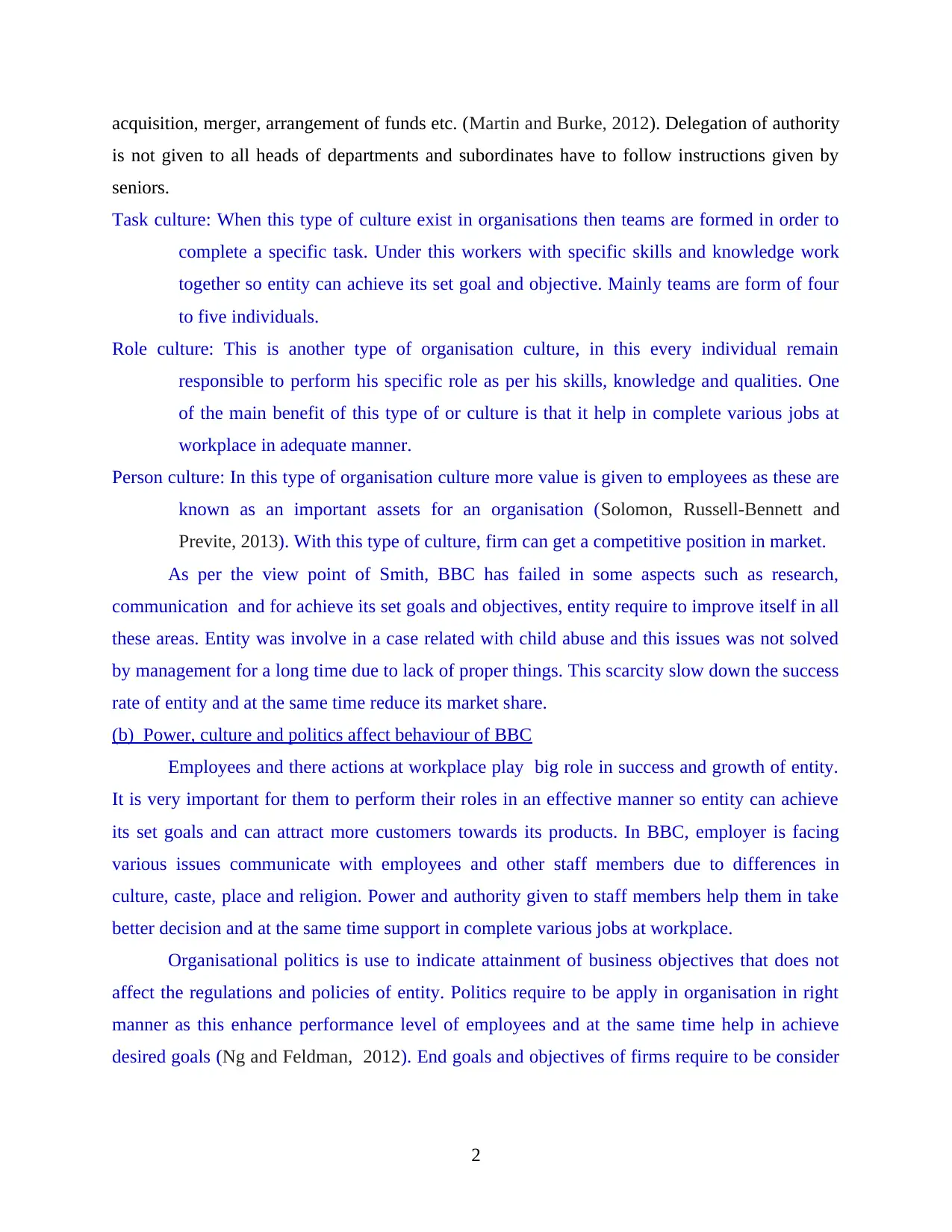
acquisition, merger, arrangement of funds etc. (Martin and Burke, 2012). Delegation of authority
is not given to all heads of departments and subordinates have to follow instructions given by
seniors.
Task culture: When this type of culture exist in organisations then teams are formed in order to
complete a specific task. Under this workers with specific skills and knowledge work
together so entity can achieve its set goal and objective. Mainly teams are form of four
to five individuals.
Role culture: This is another type of organisation culture, in this every individual remain
responsible to perform his specific role as per his skills, knowledge and qualities. One
of the main benefit of this type of or culture is that it help in complete various jobs at
workplace in adequate manner.
Person culture: In this type of organisation culture more value is given to employees as these are
known as an important assets for an organisation (Solomon, Russell-Bennett and
Previte, 2013). With this type of culture, firm can get a competitive position in market.
As per the view point of Smith, BBC has failed in some aspects such as research,
communication and for achieve its set goals and objectives, entity require to improve itself in all
these areas. Entity was involve in a case related with child abuse and this issues was not solved
by management for a long time due to lack of proper things. This scarcity slow down the success
rate of entity and at the same time reduce its market share.
(b) Power, culture and politics affect behaviour of BBC
Employees and there actions at workplace play big role in success and growth of entity.
It is very important for them to perform their roles in an effective manner so entity can achieve
its set goals and can attract more customers towards its products. In BBC, employer is facing
various issues communicate with employees and other staff members due to differences in
culture, caste, place and religion. Power and authority given to staff members help them in take
better decision and at the same time support in complete various jobs at workplace.
Organisational politics is use to indicate attainment of business objectives that does not
affect the regulations and policies of entity. Politics require to be apply in organisation in right
manner as this enhance performance level of employees and at the same time help in achieve
desired goals (Ng and Feldman, 2012). End goals and objectives of firms require to be consider
2
is not given to all heads of departments and subordinates have to follow instructions given by
seniors.
Task culture: When this type of culture exist in organisations then teams are formed in order to
complete a specific task. Under this workers with specific skills and knowledge work
together so entity can achieve its set goal and objective. Mainly teams are form of four
to five individuals.
Role culture: This is another type of organisation culture, in this every individual remain
responsible to perform his specific role as per his skills, knowledge and qualities. One
of the main benefit of this type of or culture is that it help in complete various jobs at
workplace in adequate manner.
Person culture: In this type of organisation culture more value is given to employees as these are
known as an important assets for an organisation (Solomon, Russell-Bennett and
Previte, 2013). With this type of culture, firm can get a competitive position in market.
As per the view point of Smith, BBC has failed in some aspects such as research,
communication and for achieve its set goals and objectives, entity require to improve itself in all
these areas. Entity was involve in a case related with child abuse and this issues was not solved
by management for a long time due to lack of proper things. This scarcity slow down the success
rate of entity and at the same time reduce its market share.
(b) Power, culture and politics affect behaviour of BBC
Employees and there actions at workplace play big role in success and growth of entity.
It is very important for them to perform their roles in an effective manner so entity can achieve
its set goals and can attract more customers towards its products. In BBC, employer is facing
various issues communicate with employees and other staff members due to differences in
culture, caste, place and religion. Power and authority given to staff members help them in take
better decision and at the same time support in complete various jobs at workplace.
Organisational politics is use to indicate attainment of business objectives that does not
affect the regulations and policies of entity. Politics require to be apply in organisation in right
manner as this enhance performance level of employees and at the same time help in achieve
desired goals (Ng and Feldman, 2012). End goals and objectives of firms require to be consider
2
Paraphrase This Document
Need a fresh take? Get an instant paraphrase of this document with our AI Paraphraser
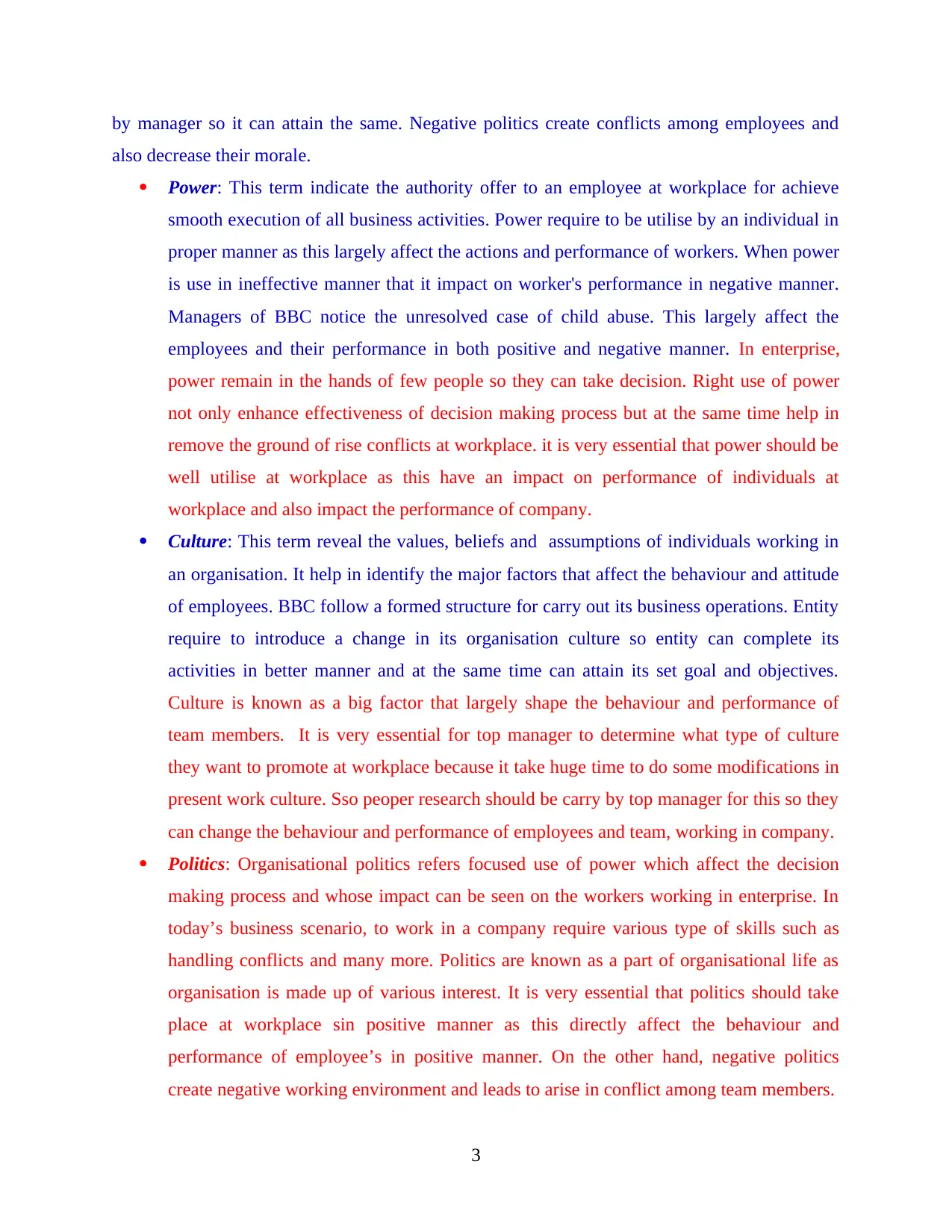
by manager so it can attain the same. Negative politics create conflicts among employees and
also decrease their morale.
Power: This term indicate the authority offer to an employee at workplace for achieve
smooth execution of all business activities. Power require to be utilise by an individual in
proper manner as this largely affect the actions and performance of workers. When power
is use in ineffective manner that it impact on worker's performance in negative manner.
Managers of BBC notice the unresolved case of child abuse. This largely affect the
employees and their performance in both positive and negative manner. In enterprise,
power remain in the hands of few people so they can take decision. Right use of power
not only enhance effectiveness of decision making process but at the same time help in
remove the ground of rise conflicts at workplace. it is very essential that power should be
well utilise at workplace as this have an impact on performance of individuals at
workplace and also impact the performance of company.
Culture: This term reveal the values, beliefs and assumptions of individuals working in
an organisation. It help in identify the major factors that affect the behaviour and attitude
of employees. BBC follow a formed structure for carry out its business operations. Entity
require to introduce a change in its organisation culture so entity can complete its
activities in better manner and at the same time can attain its set goal and objectives.
Culture is known as a big factor that largely shape the behaviour and performance of
team members. It is very essential for top manager to determine what type of culture
they want to promote at workplace because it take huge time to do some modifications in
present work culture. Sso peoper research should be carry by top manager for this so they
can change the behaviour and performance of employees and team, working in company.
Politics: Organisational politics refers focused use of power which affect the decision
making process and whose impact can be seen on the workers working in enterprise. In
today’s business scenario, to work in a company require various type of skills such as
handling conflicts and many more. Politics are known as a part of organisational life as
organisation is made up of various interest. It is very essential that politics should take
place at workplace sin positive manner as this directly affect the behaviour and
performance of employee’s in positive manner. On the other hand, negative politics
create negative working environment and leads to arise in conflict among team members.
3
also decrease their morale.
Power: This term indicate the authority offer to an employee at workplace for achieve
smooth execution of all business activities. Power require to be utilise by an individual in
proper manner as this largely affect the actions and performance of workers. When power
is use in ineffective manner that it impact on worker's performance in negative manner.
Managers of BBC notice the unresolved case of child abuse. This largely affect the
employees and their performance in both positive and negative manner. In enterprise,
power remain in the hands of few people so they can take decision. Right use of power
not only enhance effectiveness of decision making process but at the same time help in
remove the ground of rise conflicts at workplace. it is very essential that power should be
well utilise at workplace as this have an impact on performance of individuals at
workplace and also impact the performance of company.
Culture: This term reveal the values, beliefs and assumptions of individuals working in
an organisation. It help in identify the major factors that affect the behaviour and attitude
of employees. BBC follow a formed structure for carry out its business operations. Entity
require to introduce a change in its organisation culture so entity can complete its
activities in better manner and at the same time can attain its set goal and objectives.
Culture is known as a big factor that largely shape the behaviour and performance of
team members. It is very essential for top manager to determine what type of culture
they want to promote at workplace because it take huge time to do some modifications in
present work culture. Sso peoper research should be carry by top manager for this so they
can change the behaviour and performance of employees and team, working in company.
Politics: Organisational politics refers focused use of power which affect the decision
making process and whose impact can be seen on the workers working in enterprise. In
today’s business scenario, to work in a company require various type of skills such as
handling conflicts and many more. Politics are known as a part of organisational life as
organisation is made up of various interest. It is very essential that politics should take
place at workplace sin positive manner as this directly affect the behaviour and
performance of employee’s in positive manner. On the other hand, negative politics
create negative working environment and leads to arise in conflict among team members.
3
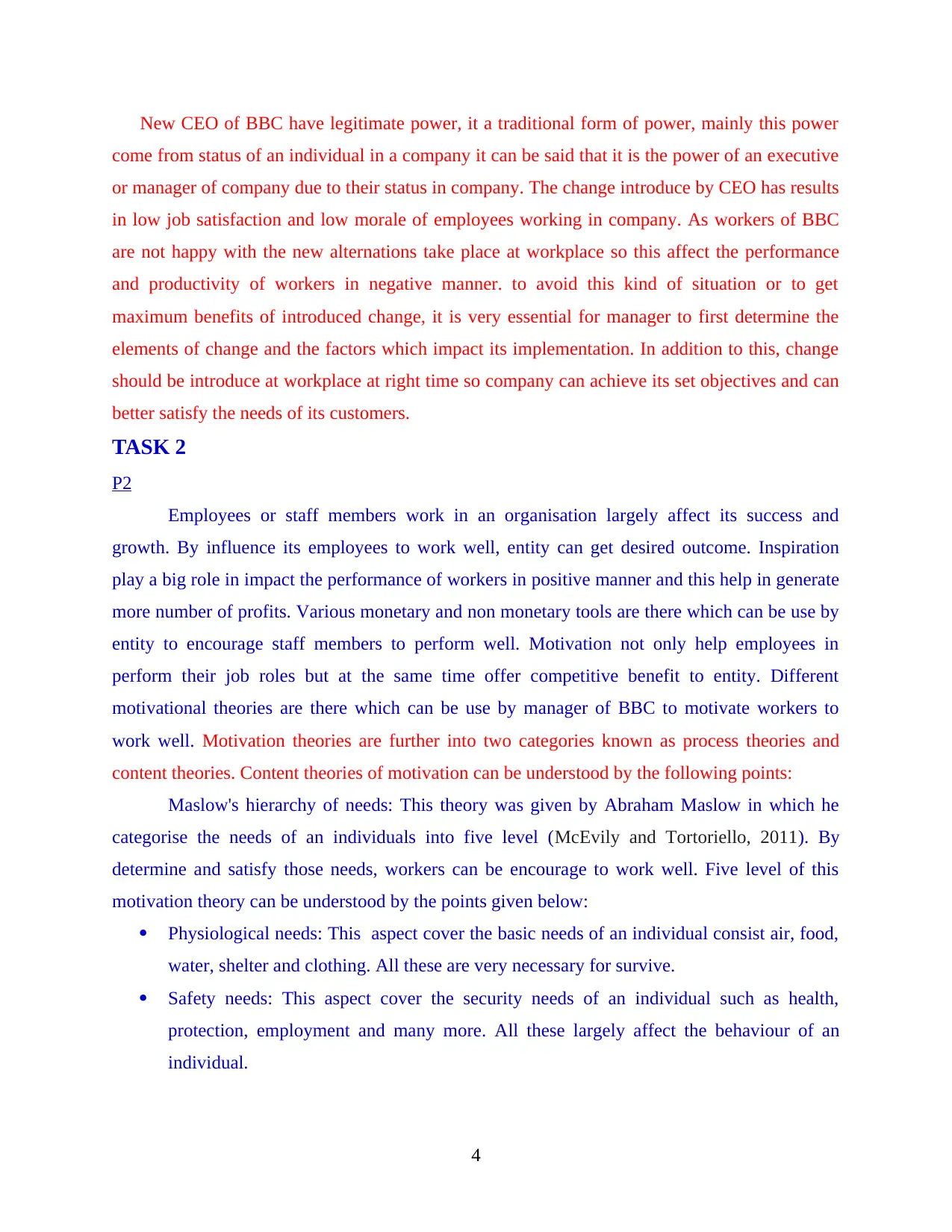
New CEO of BBC have legitimate power, it a traditional form of power, mainly this power
come from status of an individual in a company it can be said that it is the power of an executive
or manager of company due to their status in company. The change introduce by CEO has results
in low job satisfaction and low morale of employees working in company. As workers of BBC
are not happy with the new alternations take place at workplace so this affect the performance
and productivity of workers in negative manner. to avoid this kind of situation or to get
maximum benefits of introduced change, it is very essential for manager to first determine the
elements of change and the factors which impact its implementation. In addition to this, change
should be introduce at workplace at right time so company can achieve its set objectives and can
better satisfy the needs of its customers.
TASK 2
P2
Employees or staff members work in an organisation largely affect its success and
growth. By influence its employees to work well, entity can get desired outcome. Inspiration
play a big role in impact the performance of workers in positive manner and this help in generate
more number of profits. Various monetary and non monetary tools are there which can be use by
entity to encourage staff members to perform well. Motivation not only help employees in
perform their job roles but at the same time offer competitive benefit to entity. Different
motivational theories are there which can be use by manager of BBC to motivate workers to
work well. Motivation theories are further into two categories known as process theories and
content theories. Content theories of motivation can be understood by the following points:
Maslow's hierarchy of needs: This theory was given by Abraham Maslow in which he
categorise the needs of an individuals into five level (McEvily and Tortoriello, 2011). By
determine and satisfy those needs, workers can be encourage to work well. Five level of this
motivation theory can be understood by the points given below:
Physiological needs: This aspect cover the basic needs of an individual consist air, food,
water, shelter and clothing. All these are very necessary for survive.
Safety needs: This aspect cover the security needs of an individual such as health,
protection, employment and many more. All these largely affect the behaviour of an
individual.
4
come from status of an individual in a company it can be said that it is the power of an executive
or manager of company due to their status in company. The change introduce by CEO has results
in low job satisfaction and low morale of employees working in company. As workers of BBC
are not happy with the new alternations take place at workplace so this affect the performance
and productivity of workers in negative manner. to avoid this kind of situation or to get
maximum benefits of introduced change, it is very essential for manager to first determine the
elements of change and the factors which impact its implementation. In addition to this, change
should be introduce at workplace at right time so company can achieve its set objectives and can
better satisfy the needs of its customers.
TASK 2
P2
Employees or staff members work in an organisation largely affect its success and
growth. By influence its employees to work well, entity can get desired outcome. Inspiration
play a big role in impact the performance of workers in positive manner and this help in generate
more number of profits. Various monetary and non monetary tools are there which can be use by
entity to encourage staff members to perform well. Motivation not only help employees in
perform their job roles but at the same time offer competitive benefit to entity. Different
motivational theories are there which can be use by manager of BBC to motivate workers to
work well. Motivation theories are further into two categories known as process theories and
content theories. Content theories of motivation can be understood by the following points:
Maslow's hierarchy of needs: This theory was given by Abraham Maslow in which he
categorise the needs of an individuals into five level (McEvily and Tortoriello, 2011). By
determine and satisfy those needs, workers can be encourage to work well. Five level of this
motivation theory can be understood by the points given below:
Physiological needs: This aspect cover the basic needs of an individual consist air, food,
water, shelter and clothing. All these are very necessary for survive.
Safety needs: This aspect cover the security needs of an individual such as health,
protection, employment and many more. All these largely affect the behaviour of an
individual.
4
⊘ This is a preview!⊘
Do you want full access?
Subscribe today to unlock all pages.

Trusted by 1+ million students worldwide
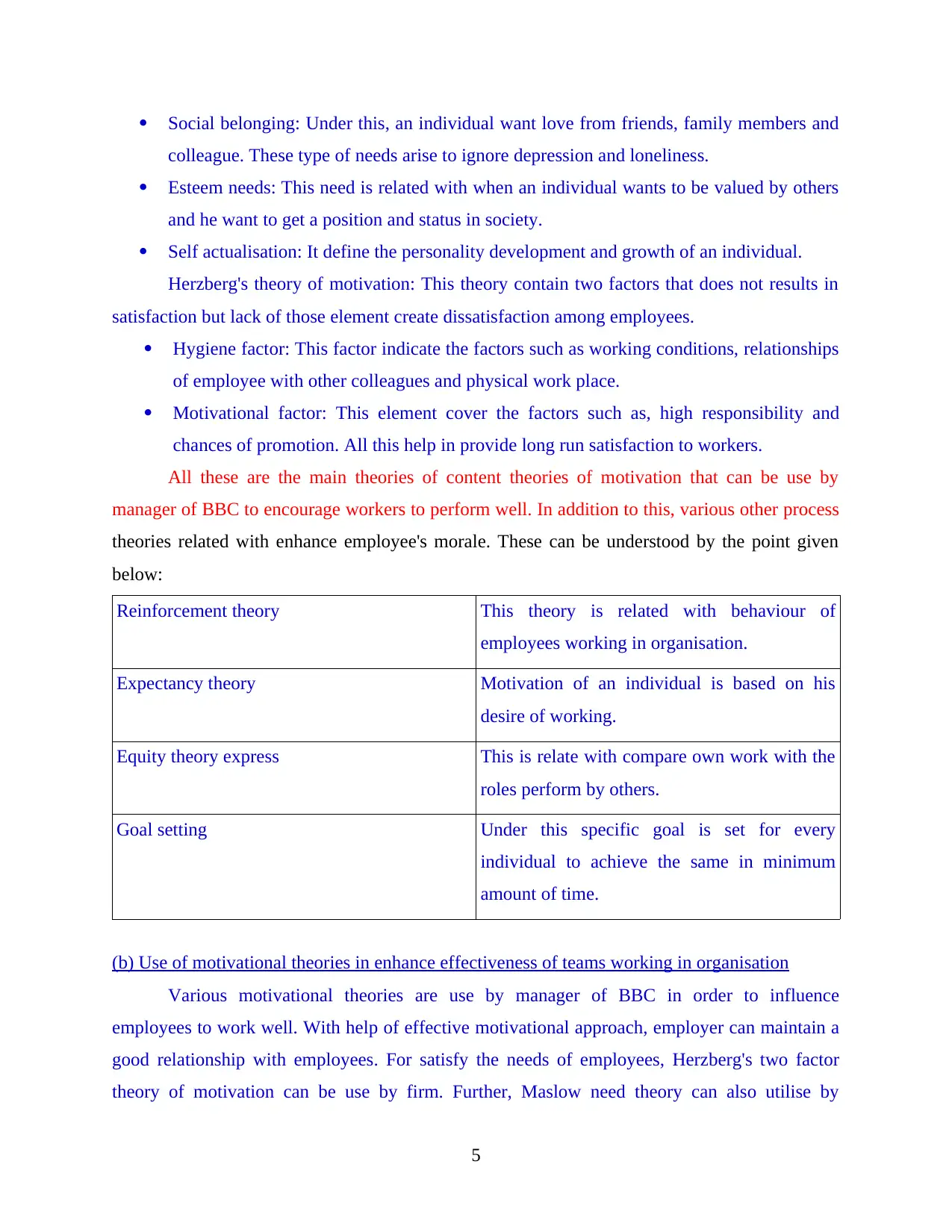
Social belonging: Under this, an individual want love from friends, family members and
colleague. These type of needs arise to ignore depression and loneliness.
Esteem needs: This need is related with when an individual wants to be valued by others
and he want to get a position and status in society.
Self actualisation: It define the personality development and growth of an individual.
Herzberg's theory of motivation: This theory contain two factors that does not results in
satisfaction but lack of those element create dissatisfaction among employees.
Hygiene factor: This factor indicate the factors such as working conditions, relationships
of employee with other colleagues and physical work place.
Motivational factor: This element cover the factors such as, high responsibility and
chances of promotion. All this help in provide long run satisfaction to workers.
All these are the main theories of content theories of motivation that can be use by
manager of BBC to encourage workers to perform well. In addition to this, various other process
theories related with enhance employee's morale. These can be understood by the point given
below:
Reinforcement theory This theory is related with behaviour of
employees working in organisation.
Expectancy theory Motivation of an individual is based on his
desire of working.
Equity theory express This is relate with compare own work with the
roles perform by others.
Goal setting Under this specific goal is set for every
individual to achieve the same in minimum
amount of time.
(b) Use of motivational theories in enhance effectiveness of teams working in organisation
Various motivational theories are use by manager of BBC in order to influence
employees to work well. With help of effective motivational approach, employer can maintain a
good relationship with employees. For satisfy the needs of employees, Herzberg's two factor
theory of motivation can be use by firm. Further, Maslow need theory can also utilise by
5
colleague. These type of needs arise to ignore depression and loneliness.
Esteem needs: This need is related with when an individual wants to be valued by others
and he want to get a position and status in society.
Self actualisation: It define the personality development and growth of an individual.
Herzberg's theory of motivation: This theory contain two factors that does not results in
satisfaction but lack of those element create dissatisfaction among employees.
Hygiene factor: This factor indicate the factors such as working conditions, relationships
of employee with other colleagues and physical work place.
Motivational factor: This element cover the factors such as, high responsibility and
chances of promotion. All this help in provide long run satisfaction to workers.
All these are the main theories of content theories of motivation that can be use by
manager of BBC to encourage workers to perform well. In addition to this, various other process
theories related with enhance employee's morale. These can be understood by the point given
below:
Reinforcement theory This theory is related with behaviour of
employees working in organisation.
Expectancy theory Motivation of an individual is based on his
desire of working.
Equity theory express This is relate with compare own work with the
roles perform by others.
Goal setting Under this specific goal is set for every
individual to achieve the same in minimum
amount of time.
(b) Use of motivational theories in enhance effectiveness of teams working in organisation
Various motivational theories are use by manager of BBC in order to influence
employees to work well. With help of effective motivational approach, employer can maintain a
good relationship with employees. For satisfy the needs of employees, Herzberg's two factor
theory of motivation can be use by firm. Further, Maslow need theory can also utilise by
5
Paraphrase This Document
Need a fresh take? Get an instant paraphrase of this document with our AI Paraphraser
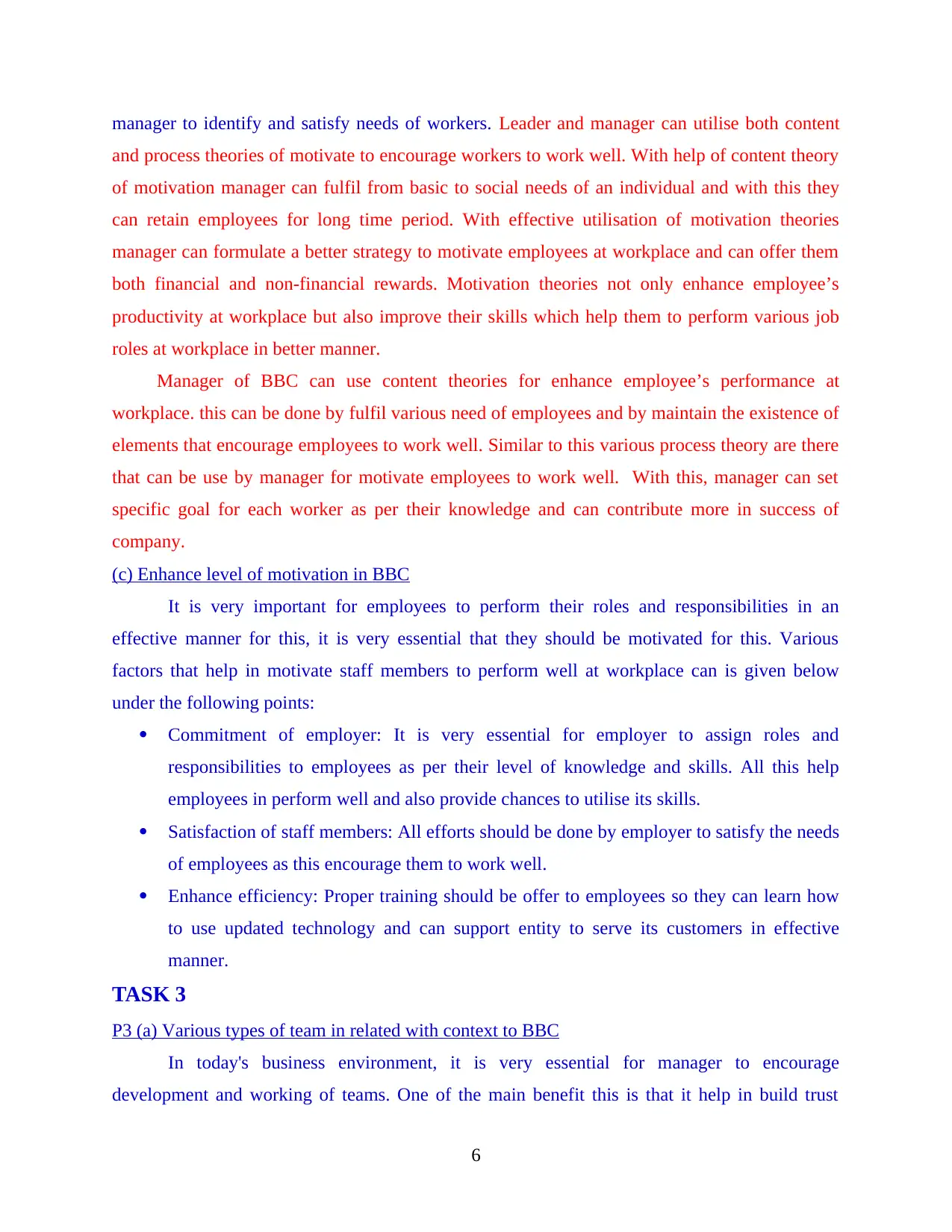
manager to identify and satisfy needs of workers. Leader and manager can utilise both content
and process theories of motivate to encourage workers to work well. With help of content theory
of motivation manager can fulfil from basic to social needs of an individual and with this they
can retain employees for long time period. With effective utilisation of motivation theories
manager can formulate a better strategy to motivate employees at workplace and can offer them
both financial and non-financial rewards. Motivation theories not only enhance employee’s
productivity at workplace but also improve their skills which help them to perform various job
roles at workplace in better manner.
Manager of BBC can use content theories for enhance employee’s performance at
workplace. this can be done by fulfil various need of employees and by maintain the existence of
elements that encourage employees to work well. Similar to this various process theory are there
that can be use by manager for motivate employees to work well. With this, manager can set
specific goal for each worker as per their knowledge and can contribute more in success of
company.
(c) Enhance level of motivation in BBC
It is very important for employees to perform their roles and responsibilities in an
effective manner for this, it is very essential that they should be motivated for this. Various
factors that help in motivate staff members to perform well at workplace can is given below
under the following points:
Commitment of employer: It is very essential for employer to assign roles and
responsibilities to employees as per their level of knowledge and skills. All this help
employees in perform well and also provide chances to utilise its skills.
Satisfaction of staff members: All efforts should be done by employer to satisfy the needs
of employees as this encourage them to work well.
Enhance efficiency: Proper training should be offer to employees so they can learn how
to use updated technology and can support entity to serve its customers in effective
manner.
TASK 3
P3 (a) Various types of team in related with context to BBC
In today's business environment, it is very essential for manager to encourage
development and working of teams. One of the main benefit this is that it help in build trust
6
and process theories of motivate to encourage workers to work well. With help of content theory
of motivation manager can fulfil from basic to social needs of an individual and with this they
can retain employees for long time period. With effective utilisation of motivation theories
manager can formulate a better strategy to motivate employees at workplace and can offer them
both financial and non-financial rewards. Motivation theories not only enhance employee’s
productivity at workplace but also improve their skills which help them to perform various job
roles at workplace in better manner.
Manager of BBC can use content theories for enhance employee’s performance at
workplace. this can be done by fulfil various need of employees and by maintain the existence of
elements that encourage employees to work well. Similar to this various process theory are there
that can be use by manager for motivate employees to work well. With this, manager can set
specific goal for each worker as per their knowledge and can contribute more in success of
company.
(c) Enhance level of motivation in BBC
It is very important for employees to perform their roles and responsibilities in an
effective manner for this, it is very essential that they should be motivated for this. Various
factors that help in motivate staff members to perform well at workplace can is given below
under the following points:
Commitment of employer: It is very essential for employer to assign roles and
responsibilities to employees as per their level of knowledge and skills. All this help
employees in perform well and also provide chances to utilise its skills.
Satisfaction of staff members: All efforts should be done by employer to satisfy the needs
of employees as this encourage them to work well.
Enhance efficiency: Proper training should be offer to employees so they can learn how
to use updated technology and can support entity to serve its customers in effective
manner.
TASK 3
P3 (a) Various types of team in related with context to BBC
In today's business environment, it is very essential for manager to encourage
development and working of teams. One of the main benefit this is that it help in build trust
6
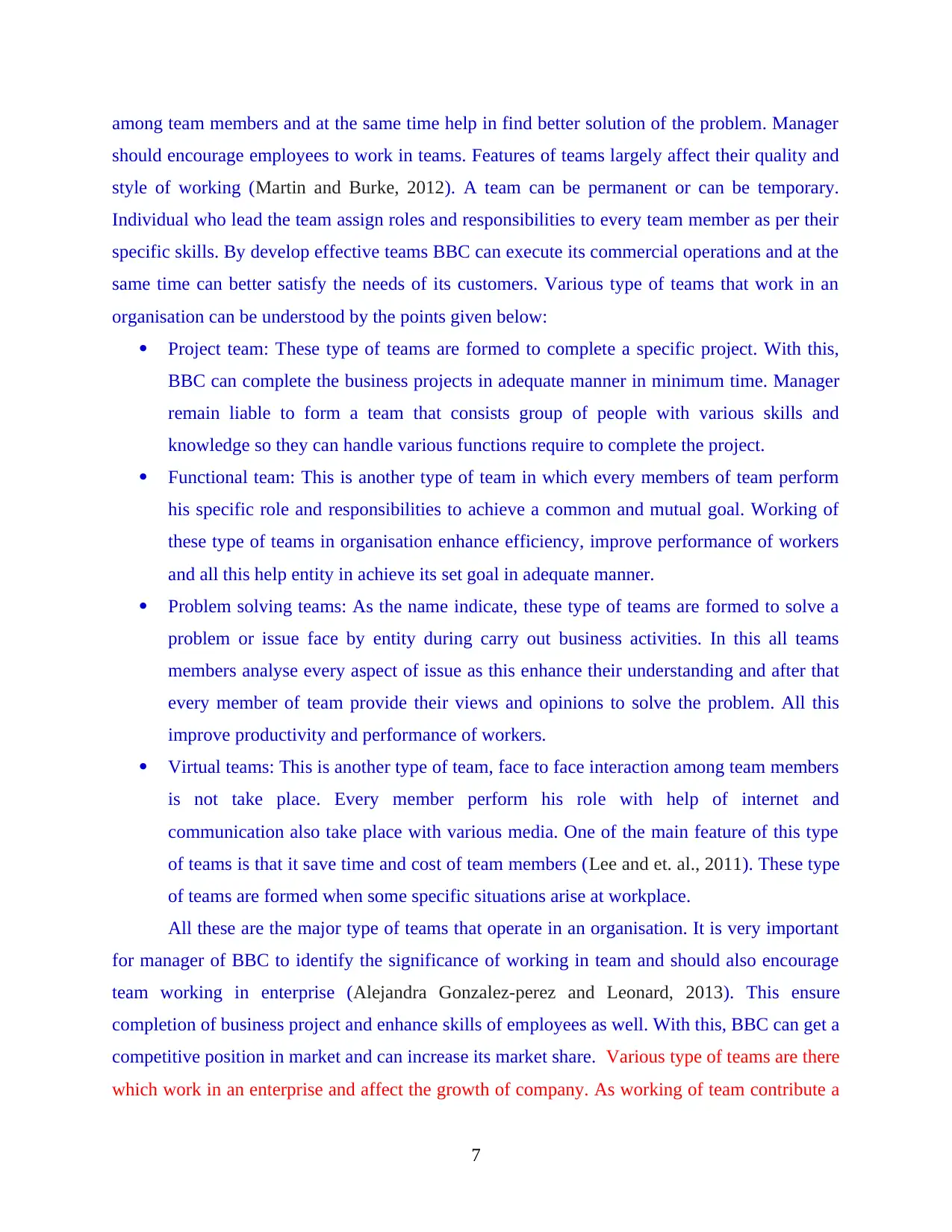
among team members and at the same time help in find better solution of the problem. Manager
should encourage employees to work in teams. Features of teams largely affect their quality and
style of working (Martin and Burke, 2012). A team can be permanent or can be temporary.
Individual who lead the team assign roles and responsibilities to every team member as per their
specific skills. By develop effective teams BBC can execute its commercial operations and at the
same time can better satisfy the needs of its customers. Various type of teams that work in an
organisation can be understood by the points given below:
Project team: These type of teams are formed to complete a specific project. With this,
BBC can complete the business projects in adequate manner in minimum time. Manager
remain liable to form a team that consists group of people with various skills and
knowledge so they can handle various functions require to complete the project.
Functional team: This is another type of team in which every members of team perform
his specific role and responsibilities to achieve a common and mutual goal. Working of
these type of teams in organisation enhance efficiency, improve performance of workers
and all this help entity in achieve its set goal in adequate manner.
Problem solving teams: As the name indicate, these type of teams are formed to solve a
problem or issue face by entity during carry out business activities. In this all teams
members analyse every aspect of issue as this enhance their understanding and after that
every member of team provide their views and opinions to solve the problem. All this
improve productivity and performance of workers.
Virtual teams: This is another type of team, face to face interaction among team members
is not take place. Every member perform his role with help of internet and
communication also take place with various media. One of the main feature of this type
of teams is that it save time and cost of team members (Lee and et. al., 2011). These type
of teams are formed when some specific situations arise at workplace.
All these are the major type of teams that operate in an organisation. It is very important
for manager of BBC to identify the significance of working in team and should also encourage
team working in enterprise (Alejandra Gonzalez-perez and Leonard, 2013). This ensure
completion of business project and enhance skills of employees as well. With this, BBC can get a
competitive position in market and can increase its market share. Various type of teams are there
which work in an enterprise and affect the growth of company. As working of team contribute a
7
should encourage employees to work in teams. Features of teams largely affect their quality and
style of working (Martin and Burke, 2012). A team can be permanent or can be temporary.
Individual who lead the team assign roles and responsibilities to every team member as per their
specific skills. By develop effective teams BBC can execute its commercial operations and at the
same time can better satisfy the needs of its customers. Various type of teams that work in an
organisation can be understood by the points given below:
Project team: These type of teams are formed to complete a specific project. With this,
BBC can complete the business projects in adequate manner in minimum time. Manager
remain liable to form a team that consists group of people with various skills and
knowledge so they can handle various functions require to complete the project.
Functional team: This is another type of team in which every members of team perform
his specific role and responsibilities to achieve a common and mutual goal. Working of
these type of teams in organisation enhance efficiency, improve performance of workers
and all this help entity in achieve its set goal in adequate manner.
Problem solving teams: As the name indicate, these type of teams are formed to solve a
problem or issue face by entity during carry out business activities. In this all teams
members analyse every aspect of issue as this enhance their understanding and after that
every member of team provide their views and opinions to solve the problem. All this
improve productivity and performance of workers.
Virtual teams: This is another type of team, face to face interaction among team members
is not take place. Every member perform his role with help of internet and
communication also take place with various media. One of the main feature of this type
of teams is that it save time and cost of team members (Lee and et. al., 2011). These type
of teams are formed when some specific situations arise at workplace.
All these are the major type of teams that operate in an organisation. It is very important
for manager of BBC to identify the significance of working in team and should also encourage
team working in enterprise (Alejandra Gonzalez-perez and Leonard, 2013). This ensure
completion of business project and enhance skills of employees as well. With this, BBC can get a
competitive position in market and can increase its market share. Various type of teams are there
which work in an enterprise and affect the growth of company. As working of team contribute a
7
⊘ This is a preview!⊘
Do you want full access?
Subscribe today to unlock all pages.

Trusted by 1+ million students worldwide
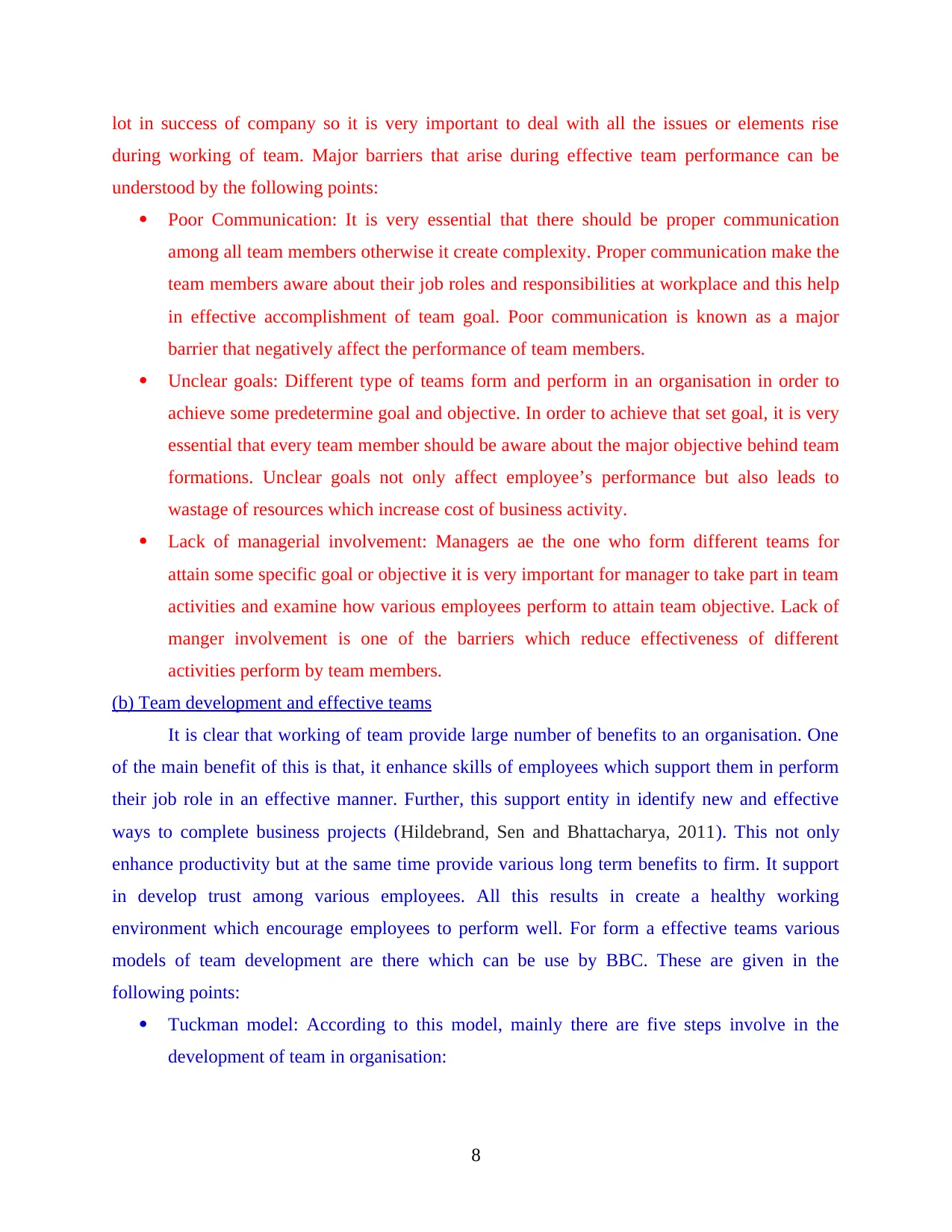
lot in success of company so it is very important to deal with all the issues or elements rise
during working of team. Major barriers that arise during effective team performance can be
understood by the following points:
Poor Communication: It is very essential that there should be proper communication
among all team members otherwise it create complexity. Proper communication make the
team members aware about their job roles and responsibilities at workplace and this help
in effective accomplishment of team goal. Poor communication is known as a major
barrier that negatively affect the performance of team members.
Unclear goals: Different type of teams form and perform in an organisation in order to
achieve some predetermine goal and objective. In order to achieve that set goal, it is very
essential that every team member should be aware about the major objective behind team
formations. Unclear goals not only affect employee’s performance but also leads to
wastage of resources which increase cost of business activity.
Lack of managerial involvement: Managers ae the one who form different teams for
attain some specific goal or objective it is very important for manager to take part in team
activities and examine how various employees perform to attain team objective. Lack of
manger involvement is one of the barriers which reduce effectiveness of different
activities perform by team members.
(b) Team development and effective teams
It is clear that working of team provide large number of benefits to an organisation. One
of the main benefit of this is that, it enhance skills of employees which support them in perform
their job role in an effective manner. Further, this support entity in identify new and effective
ways to complete business projects (Hildebrand, Sen and Bhattacharya, 2011). This not only
enhance productivity but at the same time provide various long term benefits to firm. It support
in develop trust among various employees. All this results in create a healthy working
environment which encourage employees to perform well. For form a effective teams various
models of team development are there which can be use by BBC. These are given in the
following points:
Tuckman model: According to this model, mainly there are five steps involve in the
development of team in organisation:
8
during working of team. Major barriers that arise during effective team performance can be
understood by the following points:
Poor Communication: It is very essential that there should be proper communication
among all team members otherwise it create complexity. Proper communication make the
team members aware about their job roles and responsibilities at workplace and this help
in effective accomplishment of team goal. Poor communication is known as a major
barrier that negatively affect the performance of team members.
Unclear goals: Different type of teams form and perform in an organisation in order to
achieve some predetermine goal and objective. In order to achieve that set goal, it is very
essential that every team member should be aware about the major objective behind team
formations. Unclear goals not only affect employee’s performance but also leads to
wastage of resources which increase cost of business activity.
Lack of managerial involvement: Managers ae the one who form different teams for
attain some specific goal or objective it is very important for manager to take part in team
activities and examine how various employees perform to attain team objective. Lack of
manger involvement is one of the barriers which reduce effectiveness of different
activities perform by team members.
(b) Team development and effective teams
It is clear that working of team provide large number of benefits to an organisation. One
of the main benefit of this is that, it enhance skills of employees which support them in perform
their job role in an effective manner. Further, this support entity in identify new and effective
ways to complete business projects (Hildebrand, Sen and Bhattacharya, 2011). This not only
enhance productivity but at the same time provide various long term benefits to firm. It support
in develop trust among various employees. All this results in create a healthy working
environment which encourage employees to perform well. For form a effective teams various
models of team development are there which can be use by BBC. These are given in the
following points:
Tuckman model: According to this model, mainly there are five steps involve in the
development of team in organisation:
8
Paraphrase This Document
Need a fresh take? Get an instant paraphrase of this document with our AI Paraphraser
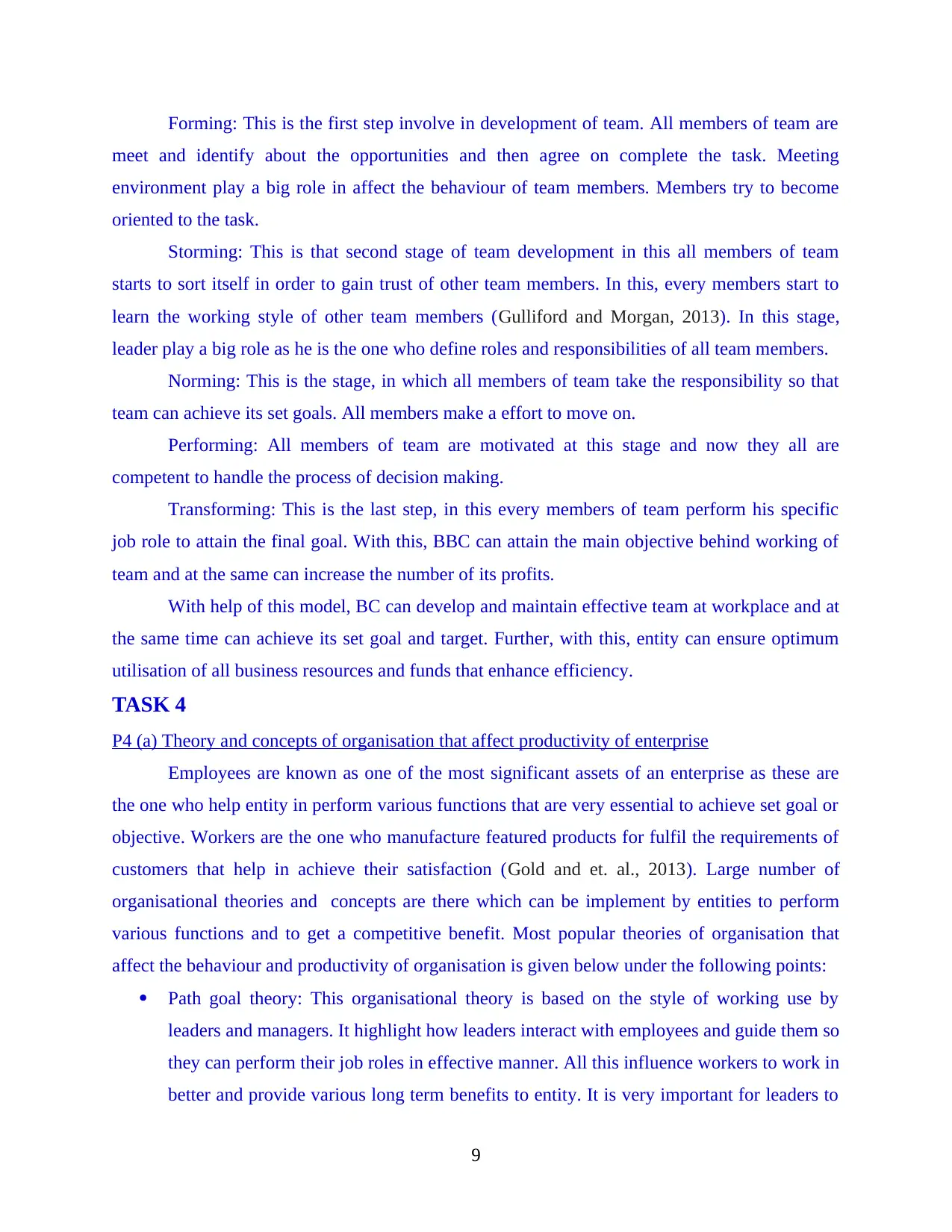
Forming: This is the first step involve in development of team. All members of team are
meet and identify about the opportunities and then agree on complete the task. Meeting
environment play a big role in affect the behaviour of team members. Members try to become
oriented to the task.
Storming: This is that second stage of team development in this all members of team
starts to sort itself in order to gain trust of other team members. In this, every members start to
learn the working style of other team members (Gulliford and Morgan, 2013). In this stage,
leader play a big role as he is the one who define roles and responsibilities of all team members.
Norming: This is the stage, in which all members of team take the responsibility so that
team can achieve its set goals. All members make a effort to move on.
Performing: All members of team are motivated at this stage and now they all are
competent to handle the process of decision making.
Transforming: This is the last step, in this every members of team perform his specific
job role to attain the final goal. With this, BBC can attain the main objective behind working of
team and at the same can increase the number of its profits.
With help of this model, BC can develop and maintain effective team at workplace and at
the same time can achieve its set goal and target. Further, with this, entity can ensure optimum
utilisation of all business resources and funds that enhance efficiency.
TASK 4
P4 (a) Theory and concepts of organisation that affect productivity of enterprise
Employees are known as one of the most significant assets of an enterprise as these are
the one who help entity in perform various functions that are very essential to achieve set goal or
objective. Workers are the one who manufacture featured products for fulfil the requirements of
customers that help in achieve their satisfaction (Gold and et. al., 2013). Large number of
organisational theories and concepts are there which can be implement by entities to perform
various functions and to get a competitive benefit. Most popular theories of organisation that
affect the behaviour and productivity of organisation is given below under the following points:
Path goal theory: This organisational theory is based on the style of working use by
leaders and managers. It highlight how leaders interact with employees and guide them so
they can perform their job roles in effective manner. All this influence workers to work in
better and provide various long term benefits to entity. It is very important for leaders to
9
meet and identify about the opportunities and then agree on complete the task. Meeting
environment play a big role in affect the behaviour of team members. Members try to become
oriented to the task.
Storming: This is that second stage of team development in this all members of team
starts to sort itself in order to gain trust of other team members. In this, every members start to
learn the working style of other team members (Gulliford and Morgan, 2013). In this stage,
leader play a big role as he is the one who define roles and responsibilities of all team members.
Norming: This is the stage, in which all members of team take the responsibility so that
team can achieve its set goals. All members make a effort to move on.
Performing: All members of team are motivated at this stage and now they all are
competent to handle the process of decision making.
Transforming: This is the last step, in this every members of team perform his specific
job role to attain the final goal. With this, BBC can attain the main objective behind working of
team and at the same can increase the number of its profits.
With help of this model, BC can develop and maintain effective team at workplace and at
the same time can achieve its set goal and target. Further, with this, entity can ensure optimum
utilisation of all business resources and funds that enhance efficiency.
TASK 4
P4 (a) Theory and concepts of organisation that affect productivity of enterprise
Employees are known as one of the most significant assets of an enterprise as these are
the one who help entity in perform various functions that are very essential to achieve set goal or
objective. Workers are the one who manufacture featured products for fulfil the requirements of
customers that help in achieve their satisfaction (Gold and et. al., 2013). Large number of
organisational theories and concepts are there which can be implement by entities to perform
various functions and to get a competitive benefit. Most popular theories of organisation that
affect the behaviour and productivity of organisation is given below under the following points:
Path goal theory: This organisational theory is based on the style of working use by
leaders and managers. It highlight how leaders interact with employees and guide them so
they can perform their job roles in effective manner. All this influence workers to work in
better and provide various long term benefits to entity. It is very important for leaders to
9
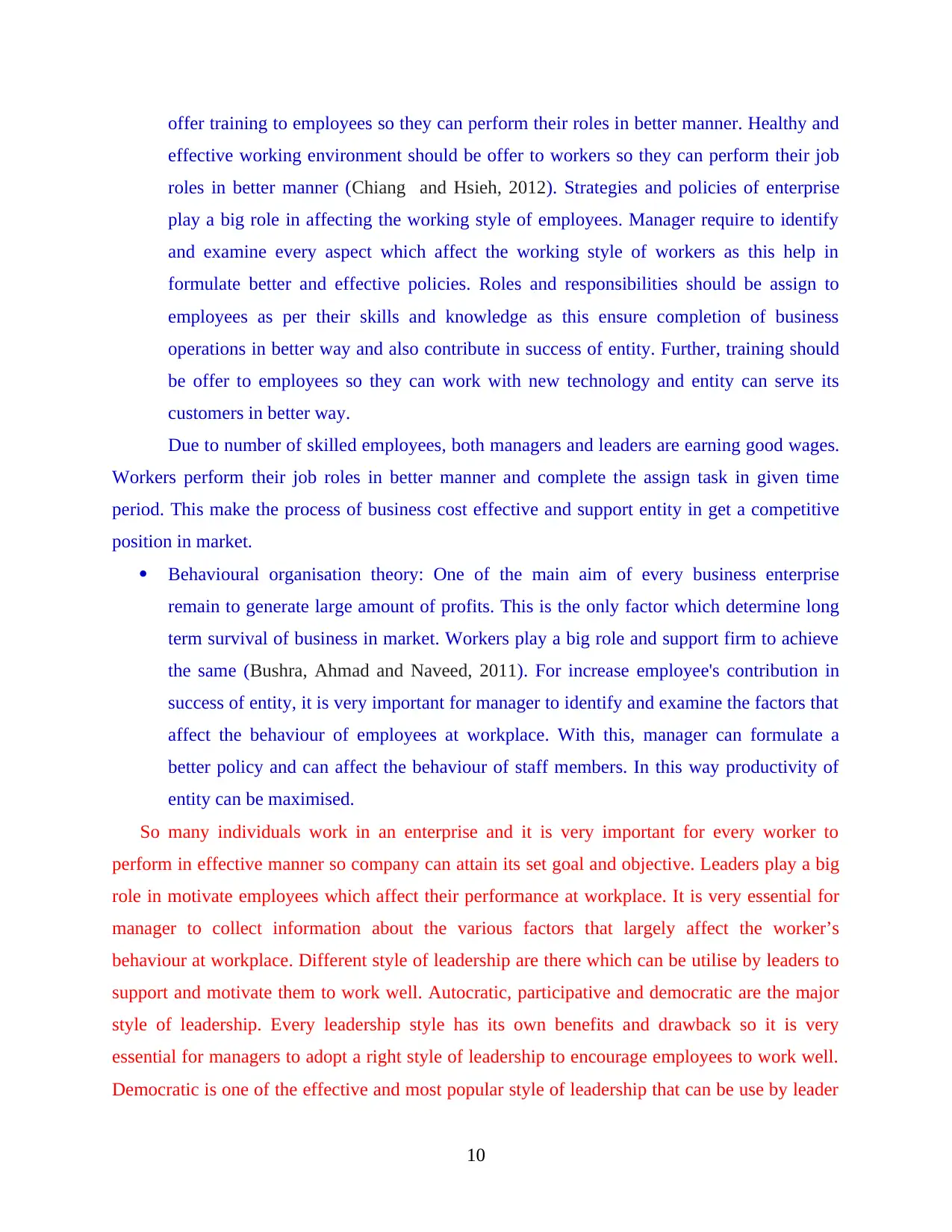
offer training to employees so they can perform their roles in better manner. Healthy and
effective working environment should be offer to workers so they can perform their job
roles in better manner (Chiang and Hsieh, 2012). Strategies and policies of enterprise
play a big role in affecting the working style of employees. Manager require to identify
and examine every aspect which affect the working style of workers as this help in
formulate better and effective policies. Roles and responsibilities should be assign to
employees as per their skills and knowledge as this ensure completion of business
operations in better way and also contribute in success of entity. Further, training should
be offer to employees so they can work with new technology and entity can serve its
customers in better way.
Due to number of skilled employees, both managers and leaders are earning good wages.
Workers perform their job roles in better manner and complete the assign task in given time
period. This make the process of business cost effective and support entity in get a competitive
position in market.
Behavioural organisation theory: One of the main aim of every business enterprise
remain to generate large amount of profits. This is the only factor which determine long
term survival of business in market. Workers play a big role and support firm to achieve
the same (Bushra, Ahmad and Naveed, 2011). For increase employee's contribution in
success of entity, it is very important for manager to identify and examine the factors that
affect the behaviour of employees at workplace. With this, manager can formulate a
better policy and can affect the behaviour of staff members. In this way productivity of
entity can be maximised.
So many individuals work in an enterprise and it is very important for every worker to
perform in effective manner so company can attain its set goal and objective. Leaders play a big
role in motivate employees which affect their performance at workplace. It is very essential for
manager to collect information about the various factors that largely affect the worker’s
behaviour at workplace. Different style of leadership are there which can be utilise by leaders to
support and motivate them to work well. Autocratic, participative and democratic are the major
style of leadership. Every leadership style has its own benefits and drawback so it is very
essential for managers to adopt a right style of leadership to encourage employees to work well.
Democratic is one of the effective and most popular style of leadership that can be use by leader
10
effective working environment should be offer to workers so they can perform their job
roles in better manner (Chiang and Hsieh, 2012). Strategies and policies of enterprise
play a big role in affecting the working style of employees. Manager require to identify
and examine every aspect which affect the working style of workers as this help in
formulate better and effective policies. Roles and responsibilities should be assign to
employees as per their skills and knowledge as this ensure completion of business
operations in better way and also contribute in success of entity. Further, training should
be offer to employees so they can work with new technology and entity can serve its
customers in better way.
Due to number of skilled employees, both managers and leaders are earning good wages.
Workers perform their job roles in better manner and complete the assign task in given time
period. This make the process of business cost effective and support entity in get a competitive
position in market.
Behavioural organisation theory: One of the main aim of every business enterprise
remain to generate large amount of profits. This is the only factor which determine long
term survival of business in market. Workers play a big role and support firm to achieve
the same (Bushra, Ahmad and Naveed, 2011). For increase employee's contribution in
success of entity, it is very important for manager to identify and examine the factors that
affect the behaviour of employees at workplace. With this, manager can formulate a
better policy and can affect the behaviour of staff members. In this way productivity of
entity can be maximised.
So many individuals work in an enterprise and it is very important for every worker to
perform in effective manner so company can attain its set goal and objective. Leaders play a big
role in motivate employees which affect their performance at workplace. It is very essential for
manager to collect information about the various factors that largely affect the worker’s
behaviour at workplace. Different style of leadership are there which can be utilise by leaders to
support and motivate them to work well. Autocratic, participative and democratic are the major
style of leadership. Every leadership style has its own benefits and drawback so it is very
essential for managers to adopt a right style of leadership to encourage employees to work well.
Democratic is one of the effective and most popular style of leadership that can be use by leader
10
⊘ This is a preview!⊘
Do you want full access?
Subscribe today to unlock all pages.

Trusted by 1+ million students worldwide
1 out of 16
Related Documents
Your All-in-One AI-Powered Toolkit for Academic Success.
+13062052269
info@desklib.com
Available 24*7 on WhatsApp / Email
![[object Object]](/_next/static/media/star-bottom.7253800d.svg)
Unlock your academic potential
Copyright © 2020–2026 A2Z Services. All Rights Reserved. Developed and managed by ZUCOL.





